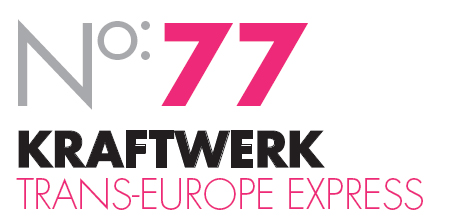
Kling Klang
Produced by Ralf Hütter and Florian Schneider
Released: March 1977
TRACKLISTING
01 Europe Endless
02 The Hall of Mirrors
03 Showroom Dummies
04 Trans-Europe Express
05 Metal on Metal
06 Franz Schubert
07 Endless Endless
In 1976 and 1977 it was as if Kraftwerk intrinsically understood everything. ‘He made up the person he wanted to be/And changed into a new personality,’ intones Ralf Hütter on the spectral pulse of ‘The Hall of Mirrors’. ‘Even the greatest stars change themselves in the looking glass.’ As punk and disco were unleashing that very transformation, with the reinvention prescribed by the song occurring in grim council flats and sun-soaked mansions around the world, Kraftwerk were creating the psychogeography of popular music’s next order.
Trans-Europe Express, the then West German quartet’s sixth studio album, is the starting point for modern electronic music; the digital age is born in these seven songs.
Trans-Europe Express is crushingly influential. Without it there is no new romantic movement or its 21st century revival, techno music is never birthed by a handful of Detroit DJs, hiphop doesn’t have key early samples, and rock bands such as Radiohead don’t have a crucial signpost. But the album goes beyond those linear links. Even though it was recorded in seclusion at the band’s Kling Klang studio in Düsseldorf, the outcome alerted even the most unlikely listener to where they should go next. The clues to post-punk’s urban suites are held in the industrial percussion and sparse production line rhythm of ‘Metal on Metal’, and throughout the record Kraftwerk’s sombre presence suggests prescience.

The four-piece – founders and mainstays Ralf Hütter and Florian Schneider, who between them handled songwriting, synthesisers, vocals and production, supported by the electronic drums of Karl Bartos and Wolfgang Flür – were virtually self-sufficient by the time they made Trans-Europe Express. Kling Klang not only afforded them creative control, but it housed advances in still nascent keyboard technology that allowed for sequenced parts. The streamlined complexity that resulted is apparent from the opening ‘Europe Endless’, where the driving beat and sleek textures suggest a panoramic view that cuts up time and reality.
‘Life is timeless,’ the track’s lyric begins, ‘parks, hotels and palaces’, and one of the fascinating strengths of Trans-Europe Express is that even while it broadcasts the future it’s finding a synthesis with the past. The Europe that once was – ‘elegance and decadence’, as ‘Europe Endless’ puts it – permeates these tracks, with the rich melody that flows across the repetitive building blocks of ‘Franz Schubert’, adding a romantic echo to sessions that were being conducted as the West German state was convulsing with the trials of the Baader-Meinhof terrorist group.
In a 1975 Creem magazine profile, Hütter flatly told writer Lester Bangs that the band supplied the media with their own photos ‘because we are paranoid’, and much was made of Schneider and Hütter’s belief in the menschmaschine (man-machine) philosophy. With their vocoder vocals, seemingly direct from a science-fiction movie, and their sleek perfection, Kraftwerk were not short of robotic precision. But these studio symphonies flicker with human desire and an obvious love for music’s possibilities. The crescendos that illuminate the title track transcend their construction to create a heartfelt beauty.
They even had a sense of humour. On ‘Showroom Dummies’ Kraftwerk imagine themselves as little more than mannequins, playing to uninformed clichés, but in the song they come alive and break the window (cue sound effects), moving through the city until they find the dancefloor at a club. ‘We’re being watched and we feel our pulse,’ they declare and Trans-Europe Express can still have the same outcome – to bring the inanimate to life – on those introduced to it today. A copy of this album deserves to be on every spacecraft that ever leaves this planet’s gravity.